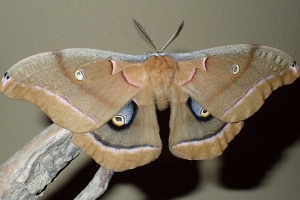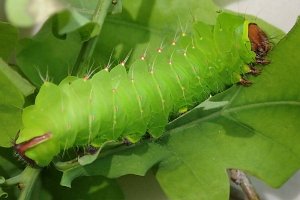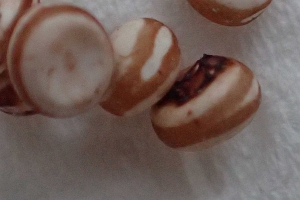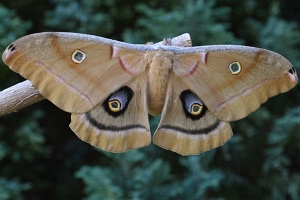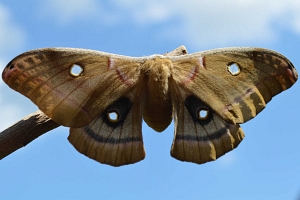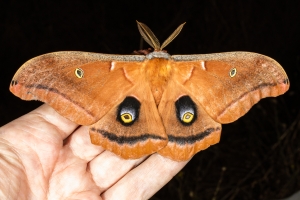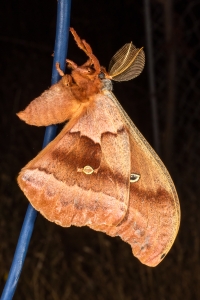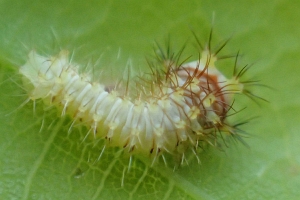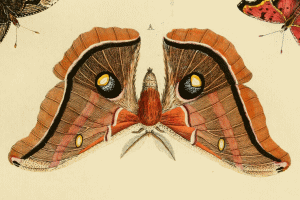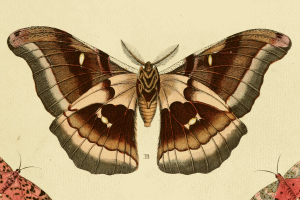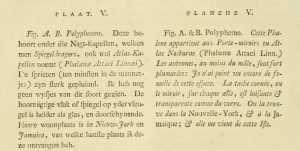

 +3Kontinente:EUNA
+3Kontinente:EUNA1. Lebendfotos
1.1. Falter
1.2. Raupe
1.3. Ei
2. Diagnose
2.1. Erstbeschreibung, darin indizierte Abbildungen und Text zu diesen
3. Weitere Informationen
3.1. Andere Kombinationen
- Phalaena polyphemus Cramer, [1776] [Originalkombination]
- Telea polyphemus (Cramer, [1776])
3.2. Synonyme
- Antheraea polypheme (Hübner, 1819) [Synonym nach funet.fi]
- Antheraea flava (Grote, 1903) [Synonym nach funet.fi]
- Antheraea fumosus (Wurster, 1930) [Synonym nach funet.fi]
- Antheraea wilfriedi (Sageder, 1933) [Synonym nach funet.fi]
- Antheraea brunnea (Sageder, 1933) [Synonym nach funet.fi]
- Antheraea nigra (Schüssler, 1936) [Synonym nach funet.fi]
- Antheraea albida (Bouvier, 1936) [Synonym nach funet.fi]
- Antheraea intermedia (Bouvier, 1936) [Synonym nach funet.fi]
3.3. Unterarten
- Antheraea polyphemus oculea (Neumoegen, 1883) [Unterart nach funet.fi]
- Antheraea polyphemus olivacea (Cockerell, 1914) [Unterart nach funet.fi]
- Antheraea polyphemus mexicana Hoffman, 1942 [Unterart nach funet.fi]
- Antheraea polyphemus tuxtlasensis Balcazár & Vázquez, 1994 [Unterart nach funet.fi]
3.4. Faunistik
Cramer ([1775]: 8) meldet: "On la trouve dans la Nouvelle-York & à la Jamaique; & elle me vient de cette Isle."
Auf der Seite der [Pacific Northwest Moths (abgefragt 23. Dezember 2021)] ist zur Verbreitrung zu lesen: "Pacific Northwest - Antheraea polyphemus is widely distributed throughout the Pacific Northwest, extending north to northeastern British Columbia. It is only absent from dry steppe in the interior of our region, such as much of southern Oregon and Idaho and the Columbia Plateau ecoregion. Global - This moth is found throughout much of North America. It is found in all Canadian provinces except Newfoundland and throughout most of the continental United States. The distribution is patchy in the West. Outside of the Pacific Northwest it occurs in most of California, and also in the central Rocky Mountains in Utah, Colorado, and northern New Mexico. It is replaced by the similar species Antherea oculea in southern Arizona and adjacent New Mexico." Von Jamaica ist hier nicht mehr die Rede. Wichtig für die Frage einer möglichen Verschleppung in andere Kontinente ist dann auch die Passage: "Economic Importance - This species is generally of no economic importance, although larvae can become occasional pests in plum orchards of California or hazelnut orchards in western Oregon."
Tatsächlich scheint es aus Europa nur eine Meldung über zwei Verschleppungen von Einzeltieren zu geben. Bei Kuchlein & de Vos (1999: 132) ist zu lesen: "[3] In 1987, a specimen of Telea polyphemus (Cramer, 1776) was found in Amsterdam, imported with a shipment of soybeans from the United States of America (pers. comm., W. Hogenes, Zoological Museum of Amsterdam). In 1998 another specimen of this North American silk moth was found, resting on a wall, in Veere (province of Zeeland)(recorded by the Rotterdam Zoo, Blijdorp). The moth presumably arrived by ship in this area. That a sound moth specimen crossed the Atlantic by itself can practically be ruled out."
Dem ist nichts hinzuzufügen.
(Autor: Erwin Rennwald)
3.5. Publikationsjahr der Erstbeschreibung
Nur der „Naamwyzer van de dag- en nagt-kapellen“ – im Band 1 der "uitlandsche kapellen" die Seiten 151-155 – ist maßgeblich für das Erscheinungsjahr der Erstbeschreibung, weil dies der einzige binominale Teil des Bandes ist. Nach Hemming (1958: 41) wurden diese Seiten 1776 publiziert.
(Autor: Jürgen Rodeland)
3.6. Literatur
- Erstbeschreibung: Cramer, P. („1779“) [1775-1776]: De uitlandsche kapellen voorkomende in de drie waereld-deelen Asia, Africa en America 1: I-XXX, 1-155, pl. I-CXVI. Amsteldam (S. J. Baalde), Utrecht (Barthelemy Wild).
- Hemming, F. (1958): Opinion 516. — Opinions and Declarations Rendered by the International Commission on Zoological Nomenclature 19 (1): 1-44. London.
- Kuchlein, J.H. & R. de Vos (1999): Geannoteerde Naamlijst van de Nederlandse Vlinders - Annotated Checklist of the Dutch Lepidoptera. — 302 S.; Leiden (Backhuys Publishers)




